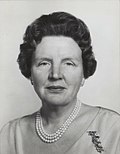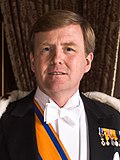List of King's and Queen's commissioners of North Brabant
For full list, see List of King's and Queen's commissioners of North Brabant (in Dutch).
| Portrait | Name (born and died) | Term | Party | Monarch | |
|---|---|---|---|---|---|
 | Jan de Quay (1901–1985) | 1 November 1946 – 19 May 1959 (12 years, 199 days) [Appt] | Catholic People's Party | Wilhelmina  (1890–1948) | |
Juliana  (1948–1980) | |||||
 | Constant Kortmann (1908–1997) | 1 October 1959 – 1 August 1973 (13 years, 304 days) | Catholic People's Party | ||
 | Gerrit Brokx (1933–2002) | 1 August 1973 – 1 December 1973 (122 days) [Ad Interim] | Catholic People's Party | ||
 | Jan Dirk van der Harten (1918–1998) [1] | 1 December 1973 – 1 June 1983 (9 years, 182 days) | Catholic People's Party (1973–1980) | ||
| Christian Democratic Appeal (1980–198) | Beatrix  (1980–2013) | ||||
 | Dries van Agt (1931–2024) [2] | 1 June 1983 – 22 April 1987 (3 years, 325 days) [Res] | Christian Democratic Appeal | ||
 | Frank Houben (1939–2023) [3] | 22 April 1987 – 1 October 2003 (16 years, 162 days) | Christian Democratic Appeal | ||
 | Hanja Maij-Weggen (born 1943) [4] | 1 October 2003 – 1 October 2009 (6 years, 0 days) | Christian Democratic Appeal | ||
 | Wim van de Donk (born 1962) [5] | 1 October 2009 – 1 October 2020 (11 years, 0 days) | Christian Democratic Appeal | ||
Willem-Alexander  (2013–present) | |||||
 | Ina Adema (born 1968) [6] | 1 October 2020 – Incumbent (4 years, 278 days) | People's Party for Freedom and Democracy | ||
- Resigned
- Ad Interim
- Resigned after appointment Prime Minister
